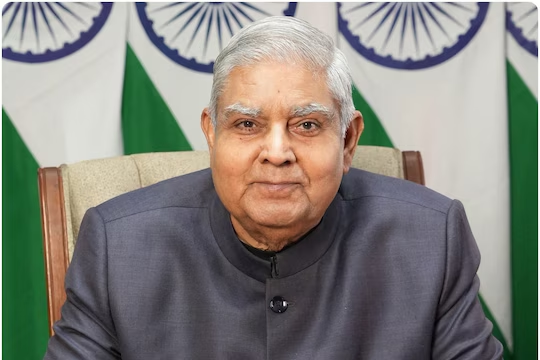آئین کے مطابق، نائب صدر کا عہدہ خالی ہونے کے بعد 60 دنوں کے اندر نیا نائب صدر منتخب کرنا لازمی ہے۔ یعنی 19 ستمبر 2025 تک یہ عمل مکمل ہونا ضروری ہے۔ امکان ہے کہ الیکشن کمیشن جلد ہی الیکشن شیڈول کا اعلان کرے گا۔ نائب صدر کا انتخاب لوک سبھا اور راجیہ سبھا کے ارکان پر مشتمل الیکٹورل کالج کے ذریعے ہوتا ہاقرأ المزيد
آئین کے مطابق، نائب صدر کا عہدہ خالی ہونے کے بعد 60 دنوں کے اندر نیا نائب صدر منتخب کرنا لازمی ہے۔ یعنی 19 ستمبر 2025 تک یہ عمل مکمل ہونا ضروری ہے۔ امکان ہے کہ الیکشن کمیشن جلد ہی الیکشن شیڈول کا اعلان کرے گا۔
نائب صدر کا انتخاب لوک سبھا اور راجیہ سبھا کے ارکان پر مشتمل الیکٹورل کالج کے ذریعے ہوتا ہے۔ اس وقت کل 788 ارکان پارلیمنٹ (543 لوک سبھا + 245 راجیہ سبھا) اس عمل میں ووٹ دیں گے۔ ووٹنگ خفیہ بیلٹ کے ذریعے کی جاتی ہے


Here’s the verified situation: according to multiple Indian outlet reports, Pakistan’s hockey federation has formally informed the FIH and Asian Hockey Federation (AHF) that it is unable to send its senior team to the upcoming Men’s Hockey Asia Cup in India, citing security concerns and players’ relاقرأ المزيد
Here’s the verified situation: according to multiple Indian outlet reports, Pakistan’s hockey federation has formally informed the FIH and Asian Hockey Federation (AHF) that it is unable to send its senior team to the upcoming Men’s Hockey Asia Cup in India, citing security concerns and players’ reluctance to travel (Bhaskar English).
Officials from the Pakistan Sports Board (PSB) have also confirmed that government clearance is still pending, with no final decision yet made. The matter remains under consideration by ministries of interior, foreign affairs, and sports (India Today).
Former hockey great Akhtar Rasool—now advising the AHF—has even suggested relocating Pakistan’s matches to a neutral venue if India cannot guarantee visas and player safety (Dawn).
Importantly, no official public statement has yet come directly from the Pakistani government confirming or denying the team’s withdrawal. Reports also mention that India’s Sports Ministry has stated that Pakistan would not be barred—in principle—from participating under the Olympic Charter, which prohibits host nations from politicizing multi-nation sport events (India Today).
✅ Summary Table
Unless new developments emerge—especially from official Pakistani sources—the reports stem primarily from Indian media and PHF communications. At present, a final decision appears pending, with the window still open for either participation (if visas and security assurances are granted) or withdrawal.
Would you like me to monitor further updates or provide background on Asia Cup qualification implications for Pakistan?
قراءة أقل